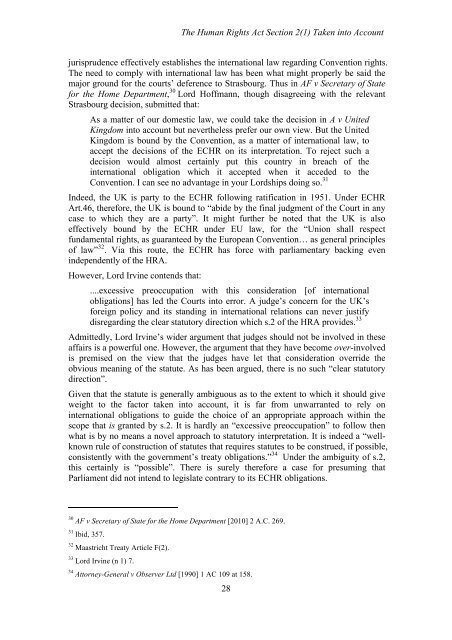Open UKLSR Volume 1(2) - Uklsa
Open UKLSR Volume 1(2) - Uklsa
Open UKLSR Volume 1(2) - Uklsa
You also want an ePaper? Increase the reach of your titles
YUMPU automatically turns print PDFs into web optimized ePapers that Google loves.
The Human Rights Act Section 2(1) Taken into Account<br />
jurisprudence effectively establishes the international law regarding Convention rights.<br />
The need to comply with international law has been what might properly be said the<br />
major ground for the courts’ deference to Strasbourg. Thus in AF v Secretary of State<br />
for the Home Department, 30 Lord Hoffmann, though disagreeing with the relevant<br />
Strasbourg decision, submitted that:<br />
As a matter of our domestic law, we could take the decision in A v United<br />
Kingdom into account but nevertheless prefer our own view. But the United<br />
Kingdom is bound by the Convention, as a matter of international law, to<br />
accept the decisions of the ECHR on its interpretation. To reject such a<br />
decision would almost certainly put this country in breach of the<br />
international obligation which it accepted when it acceded to the<br />
Convention. I can see no advantage in your Lordships doing so. 31<br />
Indeed, the UK is party to the ECHR following ratification in 1951. Under ECHR<br />
Art.46, therefore, the UK is bound to “abide by the final judgment of the Court in any<br />
case to which they are a party”. It might further be noted that the UK is also<br />
effectively bound by the ECHR under EU law, for the “Union shall respect<br />
fundamental rights, as guaranteed by the European Convention… as general principles<br />
of law” 32 . Via this route, the ECHR has force with parliamentary backing even<br />
independently of the HRA.<br />
However, Lord Irvine contends that:<br />
....excessive preoccupation with this consideration [of international<br />
obligations] has led the Courts into error. A judge’s concern for the UK’s<br />
foreign policy and its standing in international relations can never justify<br />
disregarding the clear statutory direction which s.2 of the HRA provides. 33<br />
Admittedly, Lord Irvine’s wider argument that judges should not be involved in these<br />
affairs is a powerful one. However, the argument that they have become over-involved<br />
is premised on the view that the judges have let that consideration override the<br />
obvious meaning of the statute. As has been argued, there is no such “clear statutory<br />
direction”.<br />
Given that the statute is generally ambiguous as to the extent to which it should give<br />
weight to the factor taken into account, it is far from unwarranted to rely on<br />
international obligations to guide the choice of an appropriate approach within the<br />
scope that is granted by s.2. It is hardly an “excessive preoccupation” to follow then<br />
what is by no means a novel approach to statutory interpretation. It is indeed a “wellknown<br />
rule of construction of statutes that requires statutes to be construed, if possible,<br />
consistently with the government’s treaty obligations.” 34 Under the ambiguity of s.2,<br />
this certainly is “possible”. There is surely therefore a case for presuming that<br />
Parliament did not intend to legislate contrary to its ECHR obligations.<br />
30 AF v Secretary of State for the Home Department [2010] 2 A.C. 269.<br />
31 Ibid, 357.<br />
32 Maastricht Treaty Article F(2).<br />
33 Lord Irvine (n 1) 7.<br />
34 Attorney-General v Observer Ltd [1990] 1 AC 109 at 158.<br />
28


